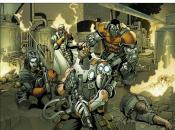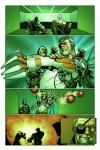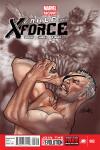|

By Brett White
There's a catastrophic event in the future of Marvel NOW!, and only Cable and X-Force can stop it.
Having made it to the other side of AVENGERS: X-SANCTION in one piece with the techno-organic virus that had been part of him since his infancy absorbed by the Phoenix, Cable has found his brain crowded with visions of the near future. No stranger to stopping disaster before it strikes, Nathan Summers has decided to play messiah one final time.
He's recruited allies both old and new to confront this threat in true X-Force style: loud, armed and dead-on. But with a mysterious ailment threatening to make this mission his last will and testament, how far will Cable go to make sure that he makes a lasting impact on the world? Dennis Hopeless breaks down the onetime mutant messiah's plan.
Marvel.com: Cable’s back in a big way. They took him off the table and kept him off, then he came back with AVENGERS X-SANCTION, so you’re picking up the baton for a big Marvel character. How does that feel to be writing the Cable story now?
Dennis Hopeless: It’s interesting. Cable and X-Force are similar. The character and the team are similar, because they sort of get reinvented every time a new title happens with them. Early on, Cable was the new militant teacher that was going to teach the New Mutants, then he was the leader of the badass X-Force, and then he was sort of the weird trying-to-figure-out-how-he’s-going-to-stop-Apocalypse-with-his-scepter guy.
I read most of that stuff, but the first stuff I read was Joe Casey’s run of that CABLE solo series. Jason Aaron just loaned me that section of it, and it was interesting because it was really good, interesting character work and cool art and I loved everything that happened in it, but it was kind of the middle act of a much larger story I had not read yet. [Laughs] That CABLE series was just this giant story that slowly went along. During that he was a very solo character. He was alone and trying to figure out what his place in the world was. And then you have CABLE & DEADPOOL where he decided he was going to fix the world by changing everyone’s skin color. He kind of embraced the messiah thing in a different way. Then you have Cable and Hope do "The Road" as they do the future and try-to-stay-alive-in-this-post-apocalyptic-world thing.
A lot like Forge, Cable's got a lot of baggage and a lot of different versions of him out there. The key for me was to find a new and interesting story to tell with the guy, and also to figure out a way to write him that takes advantage of and takes into account all those different versions of him over the years. I thought a crazy sci-fi/crime story was a good way to do that. I could keep the brooding, introspective, wants-to-save-the-world-above-all-else stuff, and kind of slam it inside his head while he’s shooting stuff up and breaking into things.
Marvel.com: Cable’s a survivor, and his illness is not something he can go beat up. This is a totally different type of threat for him. How has that changed his way of operating?
Dennis Hopeless: It’s interesting because he’s not going to be able to ignore it. In the long run that’s something he’s going to have to deal with, and what that means for his team, what that means for his mission, what that means for his relationship with his daughter he will not be able to ignore, but he’s going to try. So early on we’re going to get a lot of Cable changing the subject when that comes up and focusing on the mission. When people find out they’re terminally ill or something like that that’s going to change their life, a lot of times they, at least at first, try to focus on other things. Like “yeah yeah, I’m dying of cancer, but I’m going to do this thing.” That’s where we find Cable. I think it’ll change him a lot. It will force him to lean on his team in a way that he’s not comfortable with in a lot of ways, and it’s going to be a big part of how I’m taking Cable from where I see him after all these years of stories to where he’s going to be at the end of all this.
Marvel.com: He’s back to terrorist mode, which he was in back in the early 90’s when X-Force was very much against the X-Men. Since then he was a mainstay X-Man for a while. He was on Rogue’s squad in X-MEN for a while. Does he miss that?
Dennis Hopeless: No. My take on it is at this point he wants to be done with all of it. If it were up to him, Hope would go off and have a normal life, he would figure out how to have a normal life, and he would build a relationship with her where neither of them has to be responsible for saving the world, and where neither one of them has to be the messiah or whatever. But he’s really bad at that.
We see pretty quickly in the series that if that’s what he thinks he’s trying to do, he’s kind of ridiculous. It turns out that he’s best at this sort of thing. He’s best at the mercenary stuff, blow your way in and take out whatever needs to be taken out, and maybe answer questions later or maybe just go on the run. He’s comfortable there, so once that avenue opens itself up I think Cable goes there faster than most people would because it’s a comfort zone. It’s a thing he understands he can do. I’m trying to do kind of a “one last score gone wrong” crime story with it anyway, but what makes that similar is he’s kind of like that old-school criminal who, in the back of his mind, has always thought, “I don’t always have to do this; eventually I’m going to get that nest egg and go and live a normal life,” but really what he enjoys is the thing he’s trying to retire from. What he’s good at, and what he is, is this thing, and probably that normal life isn’t realistic. So yeah, I don’t think he has any interest in being a super hero. He likes what he does regardless of what he’s trying to tell himself, and what he’d like to do in a heart of hearts way is to live a normal life with his daughter.
Marvel.com: Speaking of family stuff, this is also an interesting time because on top of Cable being on the outs, his dad, Cyclops is also on the outs from the X-Men. It’s interesting to note that father and son are both doing what needs to be done and aren’t in good with the X-Men anymore, which Cyclops used to ride Cable hard about. Now Cyclops is doing what Cable does.
Dennis Hopeless: I play with that early on. I’d like to do stuff with Cyclops at some point, and we probably will. The plans for that are out [for now] because of what Brian [Michael Bendis is] doing with those characters over in ALL-NEW X-MEN and UNCANNY X-MEN. He needs some space to deal with all that. I’m getting the Summers tie and the “What the hell are you doing to our family name?” with Havok. Because Cyclops is off doing this thing, and because of where Havok is, I have him sort of obsessed with the idea that, "obviously whatever Cable is doing is not what it looks like, but I have to be the one that brings it in and figures it out. I need to be the one who solves this problem, because by God the Summers name is not going to be this sullied.”
Marvel.com: The Havok/Cable relationship hasn’t been explored that much. In "X-Cutioner’s Song," there was an issue where Havok leads X-Factor in an attempt to arrest X-Force. Peter David did a great job with that issue. I like seeing Havok in this role, like he does this all the time and gets tired of arresting people who should be his friends.
Dennis Hopeless: Yeah, Rick [Remender] was very adamant when I talked to him about UNCANNY AVENGERS being a part of the book, that they’re not cops. They’re not going to just assume that this stuff is all what it is on face value. Because number one, Wolverine’s on the team, and he just led an X-Force where they did a bunch of killing, so they’re not going to immediately think someone that they know to be a hero has turned into a villain. At the same time, Cable refuses to explain himself, and he makes it very difficult on them to accept that what he’s doing must be good, and there are story reasons for that. He’s seeing the future, and the more he explains it, the less likely it is to happen as he’s seeing it. In his mind, everything he’s doing makes perfect sense. [Laughs]
Marvel.com: Are you writing it so that Cable is purposely recruiting these broken individuals? Because Cable knows what Colossus just went through; is Cable preying on these people’s need to atone or need to have a purpose?
Dennis Hopeless: This is weird to say, but I think born leaders, people that are naturally good at leading, are sort of subconsciously manipulative all the time. They can see another person and see what that person is capable of and see where you’ve got to poke them to get them to do what you want them to do. Cable’s very much that; while he would tell you “No, I’m not just going after these people and taking advantage of them,” yes, he’s going after these people and taking advantage of them. He knows what they’ll be able to do. Like Colossus, he knows how to get Colossus to help him even though Colossus doesn’t want to do any of this sort of thing. We see that in a very quiet scene in issue #2. He manipulates Colossus into doing what he wants very subtly and very carefully, and it works. I think he’s just naturally good at that. He’s naturally good at seeing what people can do for him and how to get it out of them.
Purchase CABLE & X-FORCE #1 now!
|










